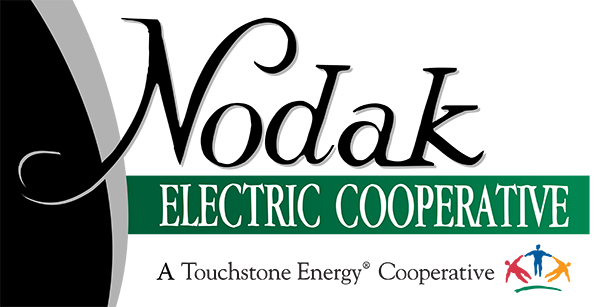Severe summer storms can cause outages. When a power outage occurs during hot weather, take
steps to maintain safety and comfort until power is restored.
High winds that topple utility poles and power lines cause many summer outages. It’s important to always stay
clear of downed power lines, even during cleanup efforts. Be alert to the possibility that tree limbs or debris may
hide an electrical hazard. Assume that any dangling wires you encounter are electrical and treat all downed or hanging lines as if they are energized and dangerous. If you are driving and come upon a downed power line, stay in your vehicle, warn others to stay away and contact emergency personnel. Also, when driving, be careful at intersections where traffic lights may be out.
If power to your home is out for a prolonged period, know and understand important safety precautions and steps to cope with heat until power is restored:
• Remember to call Nodak immediately to report the outage at 800-732-4373.
• Dress in loose, lightweight clothing and stay on the coolest, lowest level of your home.
• Use natural ventilation to cool homes and consider purchasing battery-powered fans.
• Drink plenty of water and avoid heavy meals, caffeinated drinks and alcohol.
• Keep refrigerator or freezer doors closed. A freezer that is half full or full can keep foods frozen 24
to 48 hours. Foods can stay safe in an unopened refrigerator up to four hours. If an outage lasts longer than
four hours, remove and pack meat, milk, and other dairy products in a cooler with ice.
• Use safe alternative food preparations. A barbecue grill is an excellent way to prepare food. Always
grill outside.
• Check on friends and relatives – especially children, seniors, and those with medical conditions or
disabilities. These people may need to seek emergency cooling shelters.
• Close all drapes and blinds on the sunny side of your residence.
During an outage, Nodak recommends turning off electrical appliances and unplugging major equipment, including
air conditioning units, computers and televisions. Power sometimes comes back in surges, which can damage electronics. Your circuits could overload when power returns if all your electronics are still on and plugged
in. Leave one light on to indicate that power has been restored. Wait a few minutes then turn on other appliances
and equipment one at a time. If you use a standby generator, make sure a transfer safety switch is used
or connect the appliance(s) directly to the generator output through an isolated circuit before you operate
it. This prevents electricity from traveling back through the power lines – what's known as “back feed.” Back
feed creates danger for anyone near lines, particularly crews working to restore power.
Source: SafeElectricity.org
